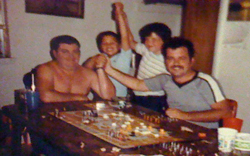
Deep Thoughts by Boba Trice
I realized late tonight that April was the 5th anniversary of the one short story I ever sold for cash. Frankly, there’s been few stories I’ve sold for even magazine copies, let alone for a real honest to goodness check. Much of my lack of fiction publishing is honestly a straight up lack of trying and commitment. I tend to assume my analytical style lends itself to nonfiction, and I’ve had plenty of success in those venues. While I’ve never had the romantic attachment to nonfiction that I have for creative storytelling, I’ve always been easily seduced into writing what gets me recognition over what I love. When a talent comes naturally and generates quick praise, too easily we can think of it as our fated partner and grow to love the ease of the gift more than the gift itself. To some degree that’s true for me and nonfiction, though I do love many apsects of my research. It’s just a different kind of love. Nonfiction is a safe, reliable love. Fiction offers anything but that.
Sometime this year, my first chapter in an academic book will go to the presses at McFarland. It likely won’t sell much, but it’ll almost certainly be my most read piece of writing to-date beyond a few articles in Dragon Magazine and the Daily Texan. And the ScreenBurn blog. I tend to forget the ScreenBurn blog because it was mostly silly fun.
Of course, Grammy was silly fun as well. I wrote the first draft in three hours and spent about a two weeks editing it, with few significant changes before submitting the story to Anotherealm. It was later published, and I’ve spent the last five years tinkering with it every time I got frustrated with whatever story festered within my brain at that moment. Grammy became a safety blanket for me. I could pluck at its story and characters while working, going back to school, and writing everything under the sun except fiction. So long as I had Grammy, I could feel okay about writing only one or two stories a year. Not that I would ever complete most of them–let alone send them out. When I wanted to feel rewarded for writing fiction, I’d workshop Grammy or send it out to some minor contest in a revised fashion: Grammy the novel, Grammy the play, Grammy the flamethrower! Hell, the Writers’ League of Texas actually gave me an award for this heroin of the mind back in 2006.
And while this behavior has undoubtedly inhibited my growth as a storyteller and writer of fiction, the same choices nurtured a handful of successes in game writing and many in scholarship by feeding my passion for storytelling just enough to allow my productivity to flow elsewhere. In an admittedly convoluted way, my addiction to Grammy earned me a Fulbright every bit as much as it stagnated my creative growth.
Now I’ve started writing a bit more fiction this summer. Thanks in no small part to a flash fiction contest I did at the end of last year that forced me to finish several stories, no matter how small. I’ve even returned to a novel inspired by Grammy where the first order of business was stripping out all the elements based on the old Grammy short story. I doubt Grammy’s dead since I have to get through a ton of research articles this year. Still, maybe after five years I’ve found a way to nurture that creative side with a bit more productivity reserved just for it.
We’ll see.

